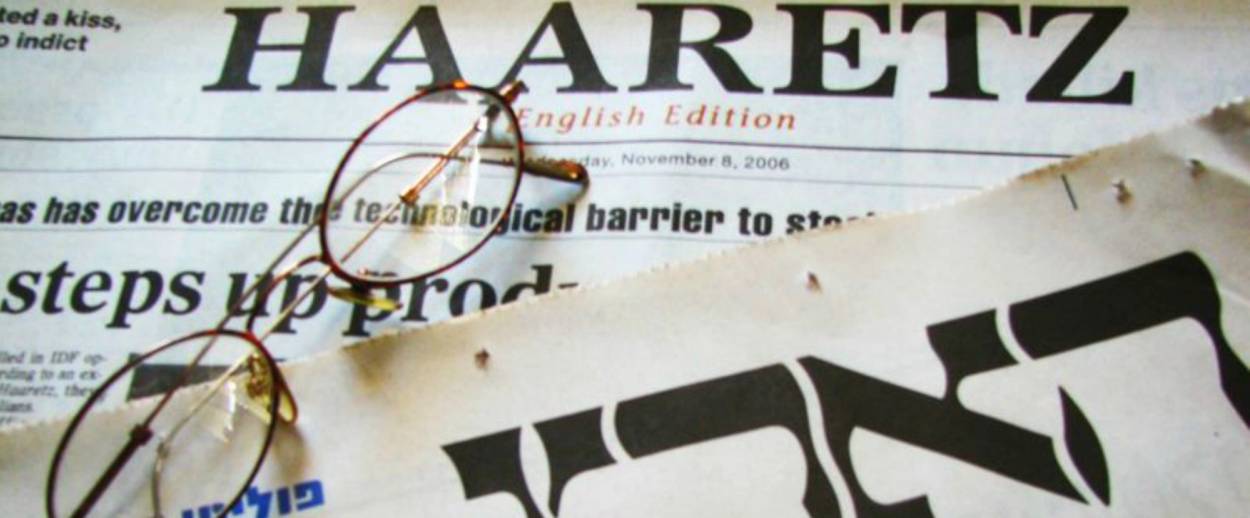Amos Schocken’s Schocking Racism
Haaretz’s publisher takes to Twitter to accuse a Mizrahi woman of swinging from trees




As Haaretz is fond of reminding its readers and its critics alike, the Israeli broadsheet is the voice of the nation’s embattled intelligentsia, an unabashedly progressive publication that spends much ink criticizing Israel’s faults, small or large, real or imagined. It’s why the paper’s long-time marketing slogan was “a newspaper for people who think”—the same distinction, presumably, did not apply to those who started their mornings with, say, Yediot Aharonot—and why it opted to celebrate Israel’s 70th Independence Day by asking its reporters to choose which classic Israeli song, the national anthem included, they despised the most. You could write all of that off as the same sort of hilariously unaware and irritating condescension you get every day in The New York Times or any other bastion of self-appointed elites anywhere; but this weekend, the paper’s publisher, Amos Schocken, crossed a line.
An active Twitter user, Schocken, the son of the newspaper’s original publisher, Gershom, got into an argument on the social media platform on Saturday after several readers tweeted at him that commemorating Israel’s Independence Day by mocking the anthem was, at best, in poor taste. Schocken held nothing back, and several of the exchanges grew heated. At some point, one woman, Ravit Dahan, tweeted at Schocken that it was security-minded people like her who kept Israel safe and allowed Schocken “to continue and live here like a king and publish your surreal newspaper without interruption.” At that, the publisher lost his cool.
“You insolent woman!” he tweeted back. “My family led the Zionist movement when you were still swinging from trees.”
It didn’t take long for people to note that a privileged, wealthy, Ashkenazi man accusing a Mizrahi woman of apishness was, to put it mildly, wildly racist. Schocken must’ve realized it, too, as he deleted his tweet and issued an apology, claiming that he didn’t think accusing someone of swinging from trees had any racial connotations.
You may be tempted to write this story off as just another example of someone having a momentary lapse of judgment on a pernicious platform that encourages users to favor mindless and bilious ejaculations over calm and considered speech. But Schocken’s tweet is hard to dismiss as just some unfortunate slip-up: Rather, it is a startlingly clear expression of a systemically racist worldview that has been the lifeblood of the Israeli left for at least four decades now.
Anyone wishing to better understand this paradox—that a political camp that champions the rights of Palestinians, migrant workers, and other struggling groups is quick to resort to the most prejudiced stereotypes when it comes to right-wing Mizrahi Israelis—would do well to study the seminal elections of 1977, which saw the rise of Menachem Begin’s Likud after 29 years of Labor-led governments. In his old-fashioned suits and his old-fashioned Hebrew, Begin visited neighborhoods and towns for which the left never had much use, building his base among Mizrahi Jews who felt betrayed by Labor. And not without reason: As an explosive Israeli documentary, released late last year, revealed by uncovering previously classified archival materials, the Labor-run governments of the 1950s deliberately dispatched newly arrived immigrants from North African countries to small and dusty towns down south, barred them from moving to Tel Aviv and other large cities—a restriction not placed on Polish immigrants who arrived a few years later—and went as far as threatening to take away the children of anyone who questioned the policy. At the same time, the very same architects of these horrendous policies spoke haughtily about peace and human rights, and were shocked when the Mizrahi Jews they’d spent a lifetime disdaining finally rose up and voted against them.
Writing in Haaretz shortly after the 1977 election, for example, Zeev Sternhell, a Polish-born political scientist, lamented the disaster that the uneducated Mizrahi hordes have brought upon the country he and his fellow Ashkenazi intellectuals have worked so hard to build. There were now, he thundered, two Zionisms, one “for a more mature and better educated population” that is “Ashkenazi, western, and well-to-do,” and the other “aggressive, extremist, clerical, negating the civil rights of others” and consisting solely of folks “from bad neighborhoods.” Israeli voters, unsurprisingly, continued to reject this revolting worldview, dealing the left one electoral blow after another.
And that’s a real pity. Israel could use real liberals, not ones that congratulate themselves as progressives while viewing right-wing Israelis of North African descent as uncultured tree-dwellers. Shame on Amos Schocken and anyone who shares his benighted views.
Liel Leibovitz is editor-at-large for Tablet Magazine and a host of its weekly culture podcast Unorthodox and daily Talmud podcast Take One. He is the editor of Zionism: The Tablet Guide.